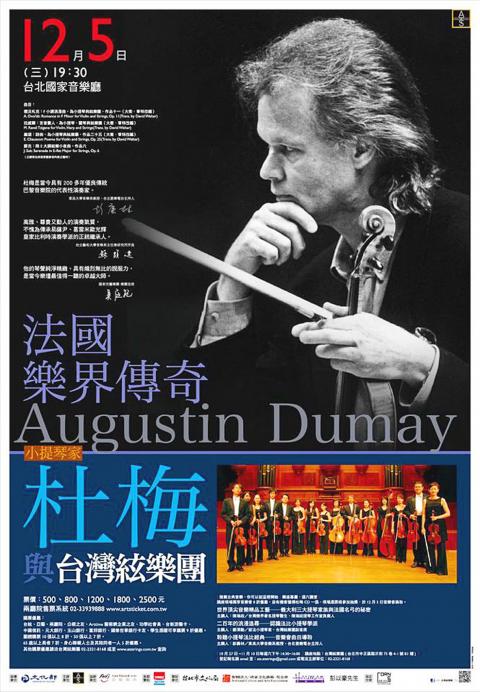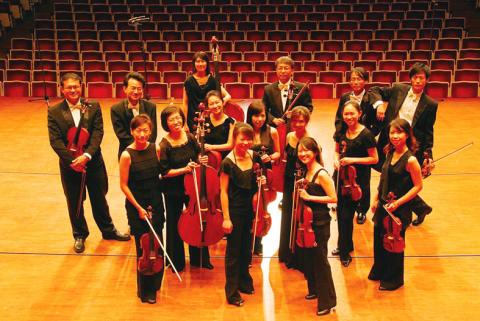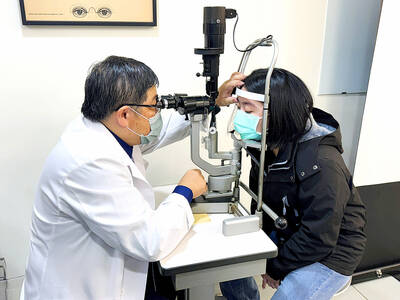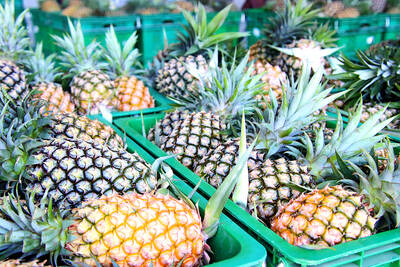For its end-of-year concert, the Academy of Taiwan Strings (ATS) has invited world-renowned French violinist Augustine Dumay, one of the main jury members for Belgian’s prestigious Queen Elisabeth Competition, to perform with them next month.
Born in Paris in 1949, Dumay entered the Conservatoire de Paris at the age of 10, and by the age of 14 he had already played a solo recital at Switzerland’s Septembre Musical de Montreux. In 1979, he performed as a soloist with the Berlin Philharmonic, under the baton of Herbert von Karajan, and cellist Yo-Yo Ma, which established him as an international fixture on the classical music scene. When he is not performing, Dumay teaches at the Queen Elisabeth College of Music in Belgium. In recent years, he has also become increasingly involved in conducting, and is currently the musical director of Belgian’s Royal Chamber Orchestra of Wallonia and the Kansai Philharmonic Orchestra in Japan.
He will be performing as a soloist and conducting the ATS ensemble for the concert. The program is set to include Czech composer Dvorak’s Romance in F Minor, French composer Ravel’s Tzigane, and Chausson’s Poeme — a unique French-style violin piece. In the second half of the concert, Dumay will be conducting the ensemble as they play Czech violinist and composer Josef Suk’s Serenade for Strings, a piece that Suk wrote while studying with Dvorak at the Prague Conservatory, only after his teacher suggested that he try writing lighter and more cheerful music. The concert will be held at the National Concert Hall on Dec. 5.

Photo Courtes Of Augustin Dumay
照片由奧古斯丁.杜梅提供
(Liberty Times, Translated by Kyle Jeffcoat)
台灣絃樂團將於二0一二年歲末,邀請比利時依莉莎白小提琴比賽主審法國舉世聞名的小提琴家奧古斯丁.杜梅下個月合作演出。
一九四九年生於巴黎,杜梅十歲進入巴黎音樂院。十四歲在瑞士的蒙特勒音樂節舉辦獨奏會。一九七九年與卡拉揚指揮的柏林愛樂在巴黎與大提琴家馬友友合作,奠定了國際地位與聲望。除了演奏,杜梅任教於比利時伊莉莎白皇后音樂學院,近年也跨入指揮領域,現為比利時瓦隆尼亞皇家室內樂團與日本關西愛樂音樂總監。

Photo courtesy of NTCH
照片由兩廳院提供
此次與台灣絃樂團合作,杜梅除將擔任獨奏,也將指揮演奏捷克作曲家德佛沃克的《F小調浪漫曲》、法國作曲家拉威爾的《吉普賽人》與蕭頌代表法國特殊風格的小提琴作品《詩曲》,下半場則指揮台灣絃樂團演奏捷克小提琴家與作曲家約瑟夫‧蘇克《小夜曲》,該曲是蘇克在布拉格音樂學院跟德佛沃克學作曲時,被老師說要試著寫快樂、輕快一點的曲子後之創作。台灣絃樂團十二月五日在台北國家音樂廳演出。
(自由時報記者凌美雪)

Photo courtesy of the Academy of Taiwan Strings
照片由台灣絃樂團提供

A: Recently, I’ve been seeing mosquitoes flying around in front of my eyes. The doctor said it’s the “flying-mosquito disease.” B: Flying mosquitoes? What a strange name. A: They’re actually called “floaters” in English, meaning floating debris. When fibrous substances in the vitreous body inside the eyeballs increase, floaters can appear in the visual field. B: Oh my goodness. Can you get rid of them? A: According to ophthalmologist Horng Chi-ting’s research, taking the enzymes of certain fruits is likely to help reduce floaters. A: 我最近一直覺得眼前有蚊子飛來飛去,結果醫生說是「飛蚊症」。 B: 飛蚊症?好奇怪的病名。 A: 英文名稱叫「floaters」, 也就是漂浮物的意思。 因為眼球的玻璃體中纖維化物質增多,導致視野出現漂浮物。 B: 天啊!要怎麼把蚊子趕走? A:

Bilingual Story is a fictionalized account. 雙語故事部分內容純屬虛構。 I stand by the Miluo River as dusk falls. The court betrayal is too much. I served Chu with loyalty. I forged alliances and fought corruption. But the whispers of jealous courtiers, the murmurs of treason, spoke louder. The king cast me out. The water looks calm. It promises peace. I step in. The river is cold against my legs. I hear shouts behind me — fishermen calling my name. I keep walking. The calls grow louder, but I do not turn around. The water rises to my chest. It pulls at me. I

In Taiwan, people can use a platform to rent a power washer for a weekend or share unused garage space for someone’s storage needs. These are examples of the sharing economy, a consumption model that has gained widespread adoption worldwide. This approach allows people to rent or share assets like cars, homes or even services, typically through online platforms. This innovative model poses a simple yet powerful question: why purchase infrequently used items when sharing is more practical? By making useful but idle resources accessible, the sharing economy turns them into sustainable opportunities. Internationally, platforms like Airbnb and Uber have popularized

A: What types of fruit enzymes should we take to help reduce eye floaters? B: According to a study published in the “Applied Sciences” journal by Taiwanese ophthalmologist Horng Chi-ting, pineapple, papaya and fig supplements can improve symptoms. A: Pineapples are in season now, so you should munch on more of those to get rid of floaters. B: Not quite. Enzymes can be damaged by our stomach acid if we eat the fruit directly. The doctor says taking fruit enzyme capsules is better for absorption. A: Most importantly, we should reduce our use of personal electronics to prevent floaters from